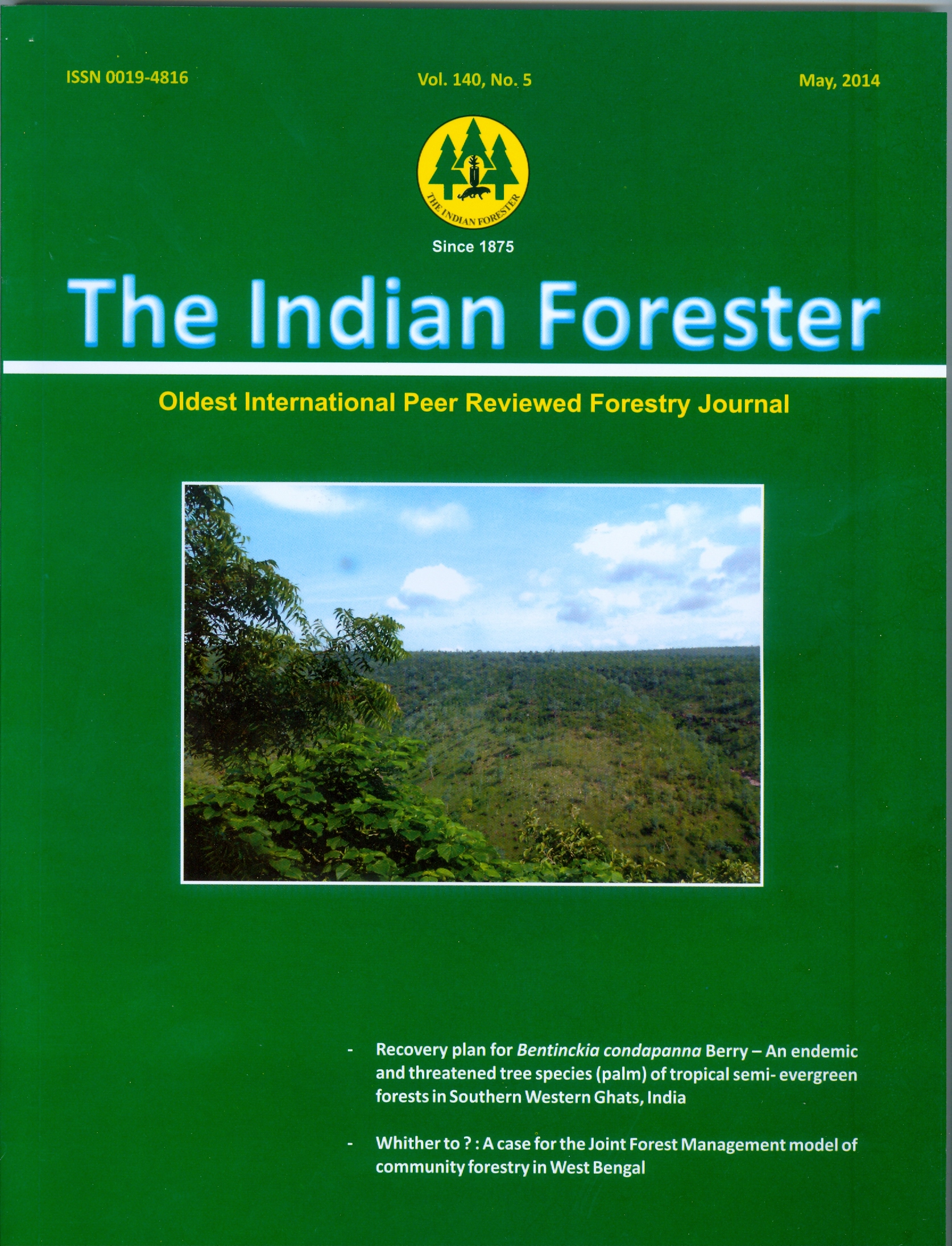Whither to ? : A Case for the Joint forest Management Model of Community forestry in West Bengal
DOI:
https://doi.org/10.36808/if/2014/v140i5/49088Keywords:
Joint Forest Management, Redd Payments, Dispossession of Communities, Policy Reforms, Value Addition.Abstract
"People-partnered, Govt.-owned" Joint Forest Management model of participatory benefit-sharing forest protection in India is under threat, even in West Bengal, where it had overwhelmingly been successful. Rising opportunity cost, due to the differential generated from spiraling appreciation in alternate use value of the forest lands and produce, visà - vis stagnancy in the volume of accruable per-capita stipulated benefits available from protecting the forests, is one of the major deterrents in this respect. To offset this, the hypothetical possibility of enhancing benefits by linking this with the newly emerging financial avenues like the REDD+ payments regime, etc. has its limitations. Excessive value addition to these resources may attract risks of dispossession to the participating communities. Alongside this, forest-fringe community development, resulting from the on-going JFM-support programme, has caused economic upliftment of the people in certain areas, that has generated a potency towards greater community assertion. Thus in accordance with the Herzberg's Two-factor Theory, enhancement of benefits to the community should go hand in hand with policy reforms, ensuring greater devolution of tenural, benefit-sharing and other participatory rights, to sustain JFM regime into the future.References
Agrawal, A., Nepstad, D. and Chhatre, A. (2011). Reducing Emissions from Deforestation and Forest Degradation; Annual Review of Environment and Resources, 36:373-396.
Chopra, K., Kadekodi, G. and Murthy, M.N. (1990). Participatory Development : People and Common Property Resources; Sage Publications;New Delhi.
Cotula, L., Dyer, N. and Vermeulen, S. (2008). Fuelling Exclusion? The Biofuels Boom and Poor Peoples' access to Land; IIED; London.
Dahal, G.R. (2012). Proposed Forest Act amendment could derail community forestry in Nepal; downloaded from http://recoftc.wordpress.com/2012/02/07/proposed-forest-act-amendment-could-derail-community-forestry-in-nepal/?utmsource=People+and+ Forests+E-News&utm-campaign=93657fc77f-People-and-Forests_E-News-February-2012&utmmedium=email on 02/03/2012.
Deb, S.B. (2009). Economic Rationality in Joint Forest Management : A saga of the Bankura (North) Division, West Bengal; Decision, Indian Institute of Management Calcutta. 36: 3
Deb, S.B. (2010). History and genesis of Joint Forest Management in India, West Bengal, Vol. LII No.3; March, 2010, Government of West Bengal.
Doolittle, A.A. (2010). The politics of Indigeneity : Indigenous Strategies for inclusion in Climate Change Negotiations; Conservation and Society, 8(4) : 256 - 261.
FAO (2005). The Global Forest Resource Assessment 2005; Food and Agricultural Organisation of the United Nations. Govt. of West Bengal, (2011). State Forest Report West Bengal 2009-10; Office of the Principal Chief Conservator of Forests, Directorate of
Forests, Kolkata.
Guha, A., Pradhan, A. and Mondal, K. (2000). Joint Forest Management in West Bengal : A long Way to Go; J. Human Ecology, 11(6) : 471-476;Kamala - Raj Enterprise; Delhi.
Guhathakurta, P. and Roy, S. (2000). Joint Forest Management in West Bengal : A Critique; Worldwide Fund for Nature - India; New Delhi.
Hardin, G. (1968). The Tragedy of Commons; Science, 162(3859) : 1243-1248.
Herzberg, F., Mausnar, B. and Suyderman, B.B. (1959). The Motivation of Work: John Wiley and Sons; New York.
Inglehart, R. and Welzel, C. (2009). How Development Leads to Democracy : What we know about Modernization; Foreign Affairs;March/April 2009.
Joshi, A. (1999). Progressive Bureaucracy : An Oxymoron ? The cause of Joint Forest Management in India; RDFM paper 24a - Winter,1998/99.
Kanel, K. (2012). Nepal - Dr. Keshav Kanal in "Forest Tenure Experiences", Forest Tenure and Policies in Lao PDR : National Workshop proceedings 28-29 November, 2011; Rights and Resource Initiative (RRI), RECOFTC and Ministry of Agriculture and Forest, Lao PDR;pgs. 12-13.
Kerr, J., Milne, G., Chhotray, V., Baumann, P. and James, A.J. (2006). Managing Watershed Externalities in India : Theory and Practice;Environment,Development and Sustainability (2006). DOI 10.1007/s 10668-005-9022-3.
Larson, A.M. (2010). Forest Tenure reform in the age of Climate Change : Lessons for REDD +; Global Environment Change; doi : 10. 1016/j.gloenvcha. 2010.11.008.
Maslow, A.H. (1943). A Theory of Human Motivation; Psychological Review; 50(4) : 370-96.
Mukherjee, P. (2003). Community Forest Management in India : The Van Panchayats of Uttaranchal; Unedited version of a paper submitted to the XII World Forestry Congress, 2003, Quebec City, Canada. Downloaded from http://www.fao.org/DORCEP/ARTICLE/WFC/XII/0108-C1.HTM .
Nepstad, D.C. and Stickler, C.M. (2008). Managing the Tropical Agricultural Revolution; Journal of Sustainable Forestry, 27(1-2).
Ostrom, E. (1990). Governing the Commons : The Evolution of Institutions for Collective Action; Cambridge University Press.
Panagre, G. and Lokur, V. (1996). The Good Society : The Pani - Panchayat Model of sustainable WaterManagement; INTACH; New Delhi.
Poffenberger, M. (1996). The Struggle for Forest Control in the Jungle Mahals of West Bengal 1750-1990, In Village Voices, Forest Choice : Joint Forest Management in India; M. Poffenberger and B. Mcgean (ed.). Oxford University Press; New Delhi.
Poffenberger, M., Mc Gean, B. and Khare, A. (1996). Communities sustaining India's Forester in the Twenty - first Century; In Village Voices, Forest Choice : Joint Forest Management in India; Mcgean (ed.). Oxford University Press; Delhi.
Rustow, W.W. (1960). The stages of Economic Growth: A Non-Communist Manifesto; Cambridge University Press.
Sinha, H. and Suar, D. (2003). Values and Peoples' participation in Community Based Forest Management; Journal of Human Values, 9(2) :141 -151.
Springate-Baginski, O., Sarin, M., Ghosh, S., Dasgupta, P., Bose, I., Banerjee, A., Sarap, K., Misra, P., Behera, S., Reddy, M.G. and Rao, P.T. (2009). Redressing 'historical injustice' through the Indian Forest Rights Act 2006; Discussion paper Series No. 27, August 2009; IIPG Discussion Paper; IIPG Programme Office, IDP
Downloads
Downloads
Published
How to Cite
Issue
Section
License
Unless otherwise stated, copyright or similar rights in all materials presented on the site, including graphical images, are owned by Indian Forester.





